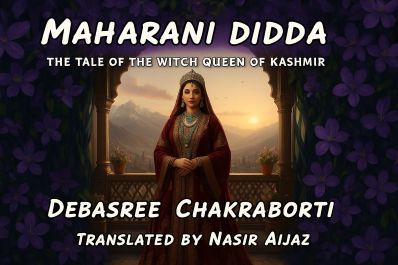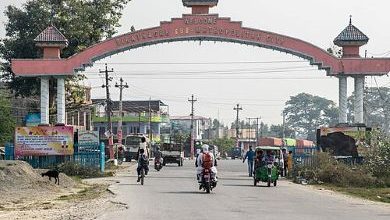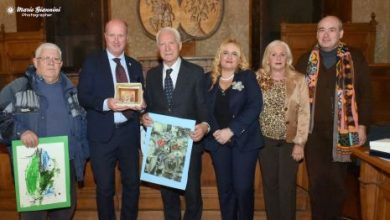Maharani Didda: Witch Queen of Kashmir-6

The little princess Diddā grows up in a strange environment. A few years after her birth, King Siṁharāja and Queen Śrīlekha had two sons. Diddā gradually realized that the affection her brothers received from their father and mother was never given to her. There were many other children in the palace; each grew up under the loving protection of their parents. But whenever Diddā went to her mother’s quarters, her mother turned her face away and said to the attendants, “What is she doing here? Take her away.”
Maharani Didda: Witch Queen of Kashmir
By Debasree Chakraborti
 Seated upon the chariot of time, Mahākāla continues to write the chronicles of a notorious queen of Kashmir through the cycles of time. In his narration, the little princess Diddā grows up in a strange environment. A few years after her birth, King Siṁharāja and Queen Śrīlekha had two sons. Diddā gradually realized that the affection her brothers received from their father and mother was never given to her. There were many other children in the palace; each grew up under the loving protection of their parents. But whenever Diddā went to her mother’s quarters, her mother turned her face away and said to the attendants, “What is she doing here? Take her away.”
Seated upon the chariot of time, Mahākāla continues to write the chronicles of a notorious queen of Kashmir through the cycles of time. In his narration, the little princess Diddā grows up in a strange environment. A few years after her birth, King Siṁharāja and Queen Śrīlekha had two sons. Diddā gradually realized that the affection her brothers received from their father and mother was never given to her. There were many other children in the palace; each grew up under the loving protection of their parents. But whenever Diddā went to her mother’s quarters, her mother turned her face away and said to the attendants, “What is she doing here? Take her away.”
Her grandfather loved her, but the relationship was never as deep—he told countless stories to her brothers, offered them many kinds of advice, but his bond with Diddā never reached such closeness. She searched for love among everyone around her, exhausting herself trying to understand the relationships surrounding her. Yet she found no real depth in any of them. Only Bhalāgā loved her. She could feel Bhalāgā’s love with all her heart. But from her father, mother, and brothers, she remained forever deprived; to them, Diddā’s presence or absence made no difference. They seemed to have no feelings for her at all.
But Bhalāgā—she was different from everyone. Bhalāgā trained her in various forms of martial arts. In these lessons, Diddā tried to discover all the joys of life. For what she received from Bhalāgā, she never received from anyone else. No one ever offered her anything out of affection; she only got the bare necessities needed for life.
Caught in this endless cycle of relationships, one day she found her way to Vikrama Sena. Vikrama Sena had been appointed as the martial instructor for Diddā’s brothers. There was a courtyard covered in green grass at one end of the Lohar palace, and one day Diddā unknowingly reached that place. For whenever Bhalāgā was busy with other work, Diddā felt terribly lonely. At such times, she wandered through the palace to forget her pain.
 On one such day, while wandering, Diddā arrived at that courtyard—where Vikrama Sena was training her brothers…He was teaching them. Vikrama Sena’s method of instruction was unique. As Diddā sat at a distance watching his way of training, she realized that everything Bhalāgā had taught her so far had come from Bhalāgā’s own initiative—no one had officially appointed her to train Diddā. But Vikrama Sena had been appointed by her father. Her father was a king; if he had chosen this man to train his two sons, then Vikrama Sena must possess some special skill.
On one such day, while wandering, Diddā arrived at that courtyard—where Vikrama Sena was training her brothers…He was teaching them. Vikrama Sena’s method of instruction was unique. As Diddā sat at a distance watching his way of training, she realized that everything Bhalāgā had taught her so far had come from Bhalāgā’s own initiative—no one had officially appointed her to train Diddā. But Vikrama Sena had been appointed by her father. Her father was a king; if he had chosen this man to train his two sons, then Vikrama Sena must possess some special skill.
After observing Vikrama Sena for quite some time, one evening—when the Goddess of Nature, draped in the crimson veil of the setting sun sinking behind the western mountains, was entering the realm of sleep—Diddā stepped forward and stood before him. Vikrama Sena had sensed the presence of this girl for several days. In that deep twilight, the glow of the girl’s beauty blended with the sun’s crimson radiance to create a strange charm, which seemed to cast its reflection upon the surroundings. The girl’s beauty and her intelligent eyes clearly revealed that she was of royal birth. Vikrama Sena knew that King Siṁharāja of Lohara had a daughter who was physically disabled. So he immediately understood the girl’s identity. But at such a moment he had no desire to engage in any conversation with her. Without saying a word, Vikrama Sena walked away.
Vikrama Sena was not one to give importance to anyone. He derived a peculiar pleasure from showing disdain toward people. Beyond what was necessary, he had no wish to speak. Because of this nature, people usually kept their distance from him. But Diddā was not like others. Whatever she set her mind upon, she would not rest until she reached that goal. Diddā had now made Vikrama Sena her next objective. For several days, she continued appearing before him in the same manner. Eventually, one day Vikrama Sena himself asked her, “If you would kindly state it—what purpose lies behind your daily visits?” Diddā folded her hands before Vikrama Sena and said, “The way you are giving military training to my two brothers, I request you to give me the same training.”
Hearing Diddā’s proposal, Vikrama Sena turned to leave without replying. But Diddā cried out, “You are refusing to train me because of my physical disability, isn’t that so?”
Vikrama Sena had not been prepared for such a question. No one ever dared speak to him in that manner. Yet in Diddā’s words he sensed sincerity and strength of character. So he turned toward her and replied, “First learn to stand on one leg—then I will train you.”
Diddā knew she could never stand on one leg. She understood that her suspicion had been right—Vikrama Sena had refused to train her because of her disability. So from that day onward, she stopped going to the place where Vikrama Sena conducted his training. From then on she became deeply dejected; surrounded by people’s hatred and contempt, she embraced solitude and confined herself within her own quarters.
 Bhalāgā could always sense Diddā’s state of mind. Given the intense hatred and disdain the girl had endured since birth, it was astonishing that she had still managed to keep her mental balance. Bhalāgā never forced Diddā to do anything. Her life was already filled with so many complexities—Bhalāgā did not wish to burden her with further obligations. To Bhalāgā, Diddā was like a sacred river, a river that must be allowed to flow freely, one that could not be held back by a dam.
Bhalāgā could always sense Diddā’s state of mind. Given the intense hatred and disdain the girl had endured since birth, it was astonishing that she had still managed to keep her mental balance. Bhalāgā never forced Diddā to do anything. Her life was already filled with so many complexities—Bhalāgā did not wish to burden her with further obligations. To Bhalāgā, Diddā was like a sacred river, a river that must be allowed to flow freely, one that could not be held back by a dam.
Bhalāgā did not question her; she simply held Diddā close to her chest throughout the day. Often, within silence itself lies the medicine that heals deep sorrow. Thus, with the passage of time, a new year arrived in the land of Kashmir. On the morning of the New Year, Bhalāgā prepared a ceremonial plate arranged with the yellow flowers of spring, a little rice, some sandal paste, curd, jaggery, a lamp, and the new almanac, and she brought it to Princess Diddā…She was still lying on her bed. Bhalāgā came and began to pull aside the curtains of the window. For many days those curtains had remained closed; such an atmosphere had been necessary for that phase of her life. Now that chapter was complete—after rest, she would once again have to move toward her goal. The new year had brought with it the promise of a new path. The light of the newly risen sun entered the room from outside and dispelled all the darkness that had gathered in the corners. Bhalāgā said, “Happy New Year, Princess. Bathe quickly and get ready—we must go to Śāradā Pīṭha.”
This was one place Diddā loved to visit. She felt completely at one with the image of Mother Śāradā. So she bathed quickly and prepared herself.
On the banks of the Kr̥ṣṇagaṅgā, deep within the forest, stood the temple of Goddess Śāradā. According to legend, when the ocean was churned and amṛta emerged, Brahmā hid the pot of nectar in this secret place.
The sacred waters of the Kr̥ṣṇagaṅgā grant healing to all. The river holds such medicinal power that any illness can be cured by its touch. White clouds drifted across the deep blue sky. In the waters of the Kr̥ṣṇagaṅgā, their reflections appeared like boats drifting. The Sun, high in the sky, seemed to coat everything with a golden glaze. All around prevailed a sublime peace; the environment was bright and pure.
At that moment Diddā took something from inside her scarf and threw it into the tiger’s mouth. Immediately, the tiger’s growl ceased. It stepped forward a couple of paces, then suddenly collapsed to the ground and began to convulse. Within moments, it was over. Bhalāgā understood part of what had happened and remained silent.
Śāradā Pīṭha had always held within it a profound sense of peace and stability. Surrounding the place was an atmosphere filled with positive energy. Throughout the year students lived and studied here. Each student had his own chamber for living. In the narrow field between the monastery buildings and the boundary wall, the shadow of the temple spire of Goddess Śāradā kept growing longer. Pine and chinar trees stood throughout the monastery grounds. Under the shade of one chinar, four āchāryas sat in relaxed conversation.
Around the spire of the temple of Goddess Śāradā was a square terrace, supported by pillars surrounding the sanctum. A narrow staircase of black stone led up to the terrace. Earthen pots filled with water were placed around the entrance of the temple. In each pot… In each of the pots there was a sapling—Persian grapevine, the Chinese charukeshar plant, and the needle-leaf sapling of Tibet.
King Siṁharāja and Queen Śrīlekha entered the sanctum of the temple of Goddess Śāradā before everyone else, accompanied by their two sons. There, before the wooden idol of the goddess, they sat and performed worship, offering oblations in the names of their sons. After the ritual, the priest applied a tilak on their foreheads.
Diddā took no part in these worldly rites; she entered the sanctum quietly with Bhalāgā, behind everyone. To those present, her presence held no value. Yet she rested her head against a wall in one corner of the sanctum and sat in silent meditation, gazing at the deity. Whenever she came to this temple, no worship was ever offered in her name—and she needed none. Through meditation, she connected with the goddess and drew from her the strength she sought. But she never asked for anything herself. Bhalāgā had taught her that the Divine had already given her everything meant for her, and so asking for more was unnecessary.
The moment she entered the sanctum, she could feel the living presence of Goddess Śāradā. It felt as though she had come to her own mother. So she sat quietly in a corner, merging her consciousness with the goddess.
When Siṁharāja and Queen Śrīlekha finished their worship, they left with their two sons. Diddā, in truth, was unwanted in their lives—her presence or absence made no difference. After sitting there for a while, she stepped out of the temple and learned that her two brothers were going to inspect Gaṇeśa Ghāṭī in the forest. Gaṇeśa Ghāṭī was a wooded valley on the bank of the Kr̥ṣṇagaṅgā. The mountain here resembled Lord Gaṇeśa. It is said that when Śāradā Pīṭha was established, Gaṇeśa himself served as the chief priest, and this mountain is his living form.
Since her brothers were going to Gaṇeśa Ghāṭī, Diddā had to go as well. They walked ahead, and Diddā followed with Bhalāgā. The valley possessed an unusual spiritual energy. There was a forest of rudrākṣa trees. Valāgā picked a rudrākṣa fruit from the ground, showed it to Diddā, and asked, “Tell me, why do you think there are so many rudrākṣa trees in this region?” Diddā had great difficulty walking. Bhalāgā had brought her an artificial leg made of wood and iron from an old man in the village of Chandanwari. It could be strapped to her weak leg and used for walking, but moving with it was extremely difficult. Bhalāgā did not like to hold Diddā while walking; she wanted Diddā to try to walk on her own. Diddā struggled with every step. Somehow, while walking with great effort, she said, “I think Lord Mahādeva dwells here. That is why there are so many rudrākṣa trees.”
Bhalāgā loved Diddā’s answer. Jokingly she said, “And where the beloved son of the Goddess, Gaṇeśa, is present, where Lord Mahādeva and daughter Śāradā are, surely Goddess Pārvatī must also be there. And in these forests, her animal attendants must be guarding the place.”
Though Bhalāgā had spoken jokingly, her words soon seemed to come true. They were walking while talking—Diddā a little ahead, Bhalāgā intentionally behind, letting her move forward so she could learn to walk alone. Ahead of Diddā were her brothers.
Just then, suddenly, a tiger emerged from the bushes and stood before them. Diddā’s elder brother was extremely clever; sensing danger, he quickly climbed a tree. But the younger brother did not know how to climb and stood helpless at the base of the tree, crying.
Diddā saw the tiger standing a short distance away from her. Without caring for her own life, she locked eyes with the tiger and, somehow dragging herself forward, managed to reach her younger brother. Then she positioned herself in front of him, shielding him.
Realizing the severity of the situation, Bhalāgā started moving toward Diddā, but Diddā signaled her not to come. When Diddā spoke to stop Bhalāgā, the tiger growled and began advancing rapidly. Hearing the roar, the younger brother started crying even louder.
At that moment Diddā took something from inside her scarf and threw it into the tiger’s mouth. Immediately, the tiger’s growl ceased. It stepped forward a couple of paces, then suddenly collapsed to the ground and began to convulse. Within moments, it was over.
Bhalāgā understood part of what had happened and remained silent. That day…The guards were with Didda’s brothers, but sensing danger at the tiger’s arrival, they too fled to a safe distance just like Didda’s elder brother and stood watching from afar.
Then, when the situation calmed down, they emerged from the surrounding bushes and carried away the dead tiger. Seeing the guards return, Didda’s elder brother climbed down from the tree and, taking his younger brother with him, started toward the Sharada Peeth along with the guards. The goddess who saved them from such grave danger—Didda, in the form of Devi Bhavani—they did not even feel the need to look back at her once. Nor did the guards feel any need to ensure this disabled princess’s safety or escort her to a secure place. Leaving her with the maid Bhalaga, they departed with the two princes.
Didda’s younger brother cried the entire way back, and when he finally saw his mother, he lost all control. Breaking free from his brother’s hand, he rushed to her, embraced her, and cried for a while, releasing all the sorrow and fear from his heart. Then he narrated everything to his mother. But after hearing all this, not even once did Didda cross their minds; they felt no desire to know how she had killed the tiger. Considering everything to be the will of Mother Sharada, they remained silent and left for the capital at dawn the next day.
This kind of behavior from her parents had no effect on Didda, for she had grown accustomed to such treatment since birth. If Bhalaga had treated her like this, perhaps then she would have felt hurt.
 Meanwhile, after returning to the capital, news of Didda’s tiger-slaying spread everywhere. The guards began to widely narrate the astonishing tale of a disabled princess killing a tiger with her own hands. Whoever heard the story added more color to it and spread it further. Eventually, these tales turned Didda into a being of superhuman qualities. This news also reached Vikramsen. One of the guards came to inform him that when the tiger was approaching Didda, an extraordinary radiance began to emanate from her crippled limb, and then Didda ran forward and struck the tiger’s mouth with that paralyzed limb with such force that…The tiger spun in the air for a while, turning in circles, and then fell far away with a heavy thud. Hearing this story, Vikramsen became extremely excited and summoned Didda to his chamber through a messenger.
Meanwhile, after returning to the capital, news of Didda’s tiger-slaying spread everywhere. The guards began to widely narrate the astonishing tale of a disabled princess killing a tiger with her own hands. Whoever heard the story added more color to it and spread it further. Eventually, these tales turned Didda into a being of superhuman qualities. This news also reached Vikramsen. One of the guards came to inform him that when the tiger was approaching Didda, an extraordinary radiance began to emanate from her crippled limb, and then Didda ran forward and struck the tiger’s mouth with that paralyzed limb with such force that…The tiger spun in the air for a while, turning in circles, and then fell far away with a heavy thud. Hearing this story, Vikramsen became extremely excited and summoned Didda to his chamber through a messenger.
Receiving that message, Didda wondered why the very person for whom she had waited day after day to receive training—only to be insulted repeatedly—had called her now. What could be his purpose today?
Bhalaga had tried many times to make Didda understand that she was already teaching her all the secret combat techniques she had inherited from her own father. So why was there any need to receive training from Vikramsen again?
In response, Didda had said, “Bhalaga, you are the closest person to me. It is my right to learn from you. But Father appointed Vikramsen as the instructor for my two brothers, not for me. Yet I also have full right over this instructor’s methods of training, and I will not allow myself to be deprived of them.”
Bhalaga clearly understood that after being deprived all her life, Didda had now learned to seize her rights on her own.
When Didda entered Vikramsen’s chamber, she found her grandfather, Bhimaraj, present there as well. Bhimaraj and Vikram were discussing some important matter. Didda’s presence made them very alert; they stopped speaking and looked at her.
After Bhimaraj whispered something softly into Vikram’s ear, Vikram asked, “Didda, we have heard that in Ganesh Ghati you killed a tiger with the blow of your foot, without using any kind of weapon. We are astonished ever since hearing this. Tell us—how did you accomplish such a feat?”
Didda saw mockery in the smiles on Vikramsen’s and her grandfather’s faces. The mockery pierced her heart like an arrow of humiliation. She understood that her disability was being used as a pawn, that many forms of ridicule were being directed at her. She had grown up receiving such treatment from her elders since childhood. Didda kept herself completely composed, and then she said:
“No, no, the tiger did not die from the blow of my foot. For a disabled woman like me, such a thing is impossible. And even for a normal, healthy person, this is not possible. Those who are spreading these stories—I believe they are doing so out of some sort of mental delusion and nothing more.”
Hearing Didda’s reply, the smiles vanished from Vikramsen’s and Bhimaraj’s faces, and they became extremely serious. The arrow of humiliation they had shot at Didda now returned to wound them instead. After a brief pause, Didda continued:
“When I was a child, Bhalaga gave me something that I kept inside the locket around my neck. Bhalaga had said that eating it could kill a person. Her parents had learned the method of making this special substance from Africa. They kept one such item in Bhalaga’s neck amulet.
They had told her to use it at a moment of danger. Before his death, her father had made several of these substances at home. From that supply, Bhalaga placed two inside my locket. I only remembered her words—that the moment this thing touches someone’s tongue, that person dies. If it can kill a human, then naturally it can kill an animal too.
So when the tiger came very close to me, I threw that substance into its mouth, and the creature died instantly.”
For a while, Vikramsen sat still, staring at Didda. He felt the weight of his own pettiness. The arrogant man who had thought of turning this disabled princess into the evening’s entertainment—an object of mockery—now realized how wrong he had been. He finally said:
“I cannot help but admire the princess’s presence of mind. You shall come to the training grounds from tomorrow.”
Hearing this proposal, tears welled up in Didda’s eyes. All her life she had been deprived of her rightful place. For the first time, someone was acknowledging her rightful due. Unable to contain herself, Didda stepped forward and touched Vikramsen’s feet, placing the dust upon her head.
Didda’s grandfather, Bhimaraj, placed a hand on Vikramsen’s shoulder and said,
“Poor girl—she will never receive the honor of becoming a royal bride. Let her at least learn the art of warfare properly, so that she can protect herself.”
His words struck a deep blow to Didda’s self-respect once again. Bhalaga had once told her that after Didda’s birth, an Aghori ascetic had made a prophecy—that one day she would rule over Kashmir. Bhalaga knew this, and surely her grandfather must have known as well. Then why was he speaking only of self-defense?
That night, Bhalaga went to Vikramsen’s chamber carrying a silk cloth, a coconut, sweets, and rice. It was a ritual that should have been performed by Didda’s mother, but Valaga completed it instead. She considered Didda her own child, and today her child had accepted Vikramsen as her teacher—so offering gifts to the guru was her sacred duty. (Continues)
Click here for Part-1, Part-2, Part-3, Part-4, Part-5,
___________________
 Debasree Chakraborti is a renowned novel writer of Bengali language. Based in Kolkata, West Bengal, India, she has done Master’s in Modern History from the Kolkata University, and authored some thirty books, mostly the novels, with historical perspective and themes. Her novel is ‘Maharaja Dahir’ that covers the history of Sindh from 662, the year of first attack on Sindh by the Arab armies till date, was published last year and translated by Nasir Aijaz into Sindhi language.
Debasree Chakraborti is a renowned novel writer of Bengali language. Based in Kolkata, West Bengal, India, she has done Master’s in Modern History from the Kolkata University, and authored some thirty books, mostly the novels, with historical perspective and themes. Her novel is ‘Maharaja Dahir’ that covers the history of Sindh from 662, the year of first attack on Sindh by the Arab armies till date, was published last year and translated by Nasir Aijaz into Sindhi language.




